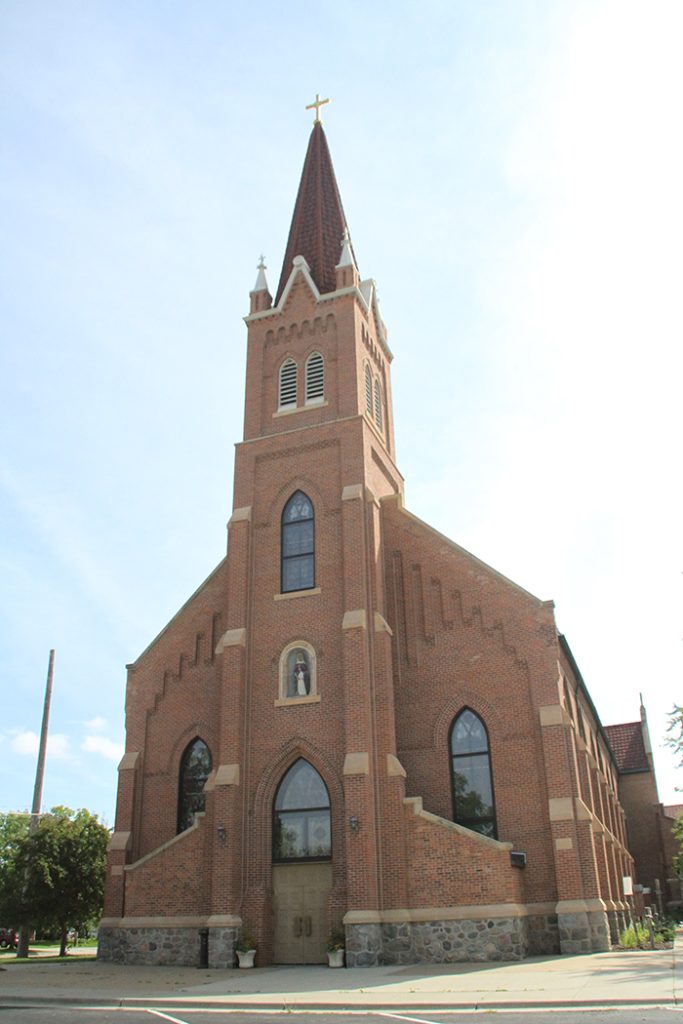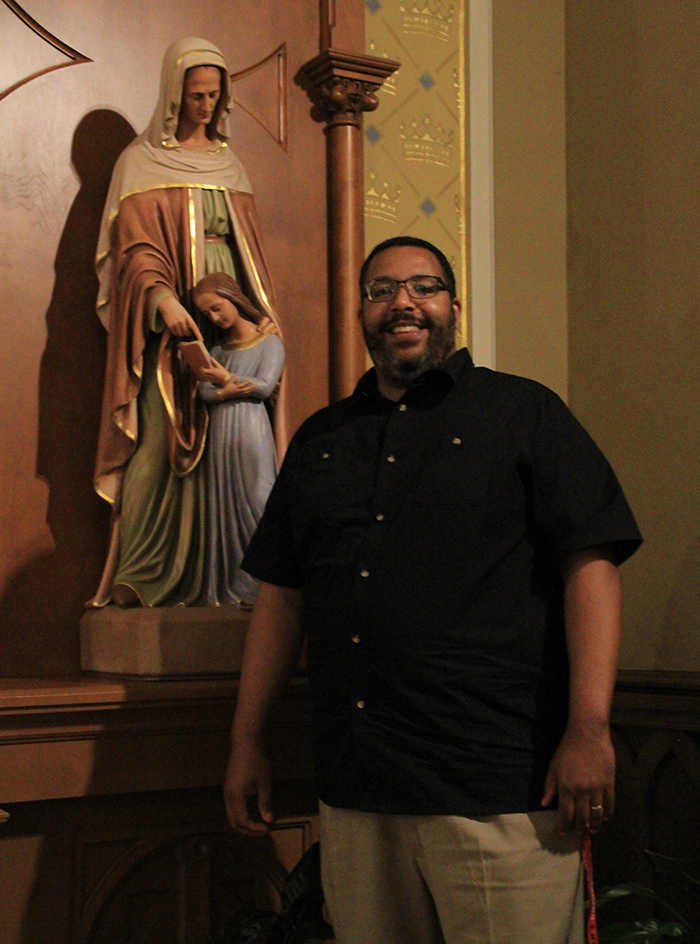Duncan finds a new calling in Catholic church
News | Published on September 6, 2022 at 2:41pm GMT+0000 | Author: Chad Koenen
0St. Ann’s parish dates back over 100 years
By Tucker Henderson
Reporter
Catholicism is the oldest of the Christian traditions to arrive in this area of Minnesota and has maintained a foothold ever since.

The parish of St. Ann’s Catholic Church dates back well over 100 years. The church is located in Wadena.
One example of the early churches in this area is St. Ann Catholic Church in Wadena. The parish has been around since 1886 and its current church building has been standing for over 100 years.
Jean-Claude “JC” Duncan decided to join the St. Ann community six years ago, after several years preaching the gospel in four local Methodist churches.
“I served the Methodist Church. My last assignment was Wadena, Deer Creek, Wrightstown, and Henning United Methodist Churches,” said Duncan. He attended seminary to serve the Methodist church in this fashion and served all four rural communities with enthusiasm. He said that his Methodist congregations have been very supportive in his transition to Catholic life.
Duncan didn’t grow up in a particularly religious family. In fact, it wasn’t until his teenage years when matters of faith entered into his life and his Christian studies began. It grew over the years and as he grew older, his calling became clear.
“I met my wife and we decided together that our family would be founded on matters of faith. It just grew from there. In that process, I never wanted to stop learning.”
JC Duncan
The never ending question “why” was a staple in Duncan’s studies, sometimes, to the annoyance of others.
“They would ask me, ‘please stop!’” Duncan joked.
As his studies continued, answers to some of the larger questions started to surface.

JC Duncan has continued ministry in tha church and is currently spreading the word of God to members at St. Ann’s Catholic Church.
“As I continued to study, I found myself drawn to a few things,” said Duncan. “Liturgy, because we see, particularly in the book of Revelation, a beautiful liturgy unfolding there. The candles and the incense and the prayers—you can almost superimpose the Mass on top of the book of Revelation and see the various liturgical acts of Mass right there in Revelation.
“History and the Eucharist is the other for me,” Duncan continued. “This area was of particular interest to me because the scriptural accounts that people would highlight were oftentimes seemingly in conflict with one another. I tried to find a harmony between some of these pronouncements that the various traditions had made.
“They Catholic Church recognizes most protestants as separated brethren,” Duncan explained. “Those who would ascribe to the historical creeds, those who would recognize the Trinity, and some other basic things are separated brethren, so we are in a brotherhood together. We practice the one baptism which the Catholic Church would acknowledge from other traditions, or ecclesial communities. Out of that stems the notion that a person is free to ultimately fulfill their spiritual unfolding as it were. Our freedom is given to us so that we can discover God. From that freedom, sometimes it means that we don’t always take the same path.”
As Duncan learned more details about the liturgy and the history of the church, a certain conviction was made on his heart.
“It was only until I went to my first seminary experience that I started to see some clarity in that,” said Duncan. “It was those two things that really, truly made me realize at some point that I must make the switch. There is a passage in scripture that says: ‘To him who knows what is right, but does not do it, to him it is sin.’ I felt that I was at that juncture where I needed to heed the prompting of the Holy Spirit and make that change.”
It was only in 2016 when Duncan, with his wife and eight children, were confirmed into the Catholic Church at St. Ann’s in Wadena. Now, he strives towards his goal of joining the priesthood, currently serving as a seminarian.
“I’m discerning to become a priest,” Duncan explained. “All Catholic priests are required to do what is called a transitional deaconal time, to practice the service and learn the service first. Currently, my primary task is to be a seminarian. I just completed my second seminary degree. Right now, I am tasked to continue to grow in that vein. Here at St. Ann’s, I am sort of a miscellaneous man. Whatever task is within my giftings, I generally do. From preparing for liturgies, assisting in the office, computer work, whatever is needed.”
Talking with different people is Duncan’s favorite part of the job. He enjoys their stories and perspectives on life that are unique to each individual.
“People bring with them their own histories and their own encounters. In many ways, we Christians should be a testament of God’s goodness. We should be a fifth testament. It’s exciting sometimes to hear how people allow that fifth testament to come to life in their lives by how they speak and care for one another. I think we could learn if we perhaps listened to one another a bit more.”
JC Duncan
Duncan noted that many people are confused as to how a married man with nine children can become a priest in the Catholic Church. A vow of celibacy is often connoted with the priesthood, so this is a fair question.
Duncan explained that after World War II, a group of German Lutherans petitioned the Catholic Pope to rejoin the church as they were disillusioned by the events of the recent war. In 1952 the Pope ordained these men to the priesthood. Duncan noted that this was part of a church tradition of balancing rulership and mercy functions.
“The church has a discipline of celibacy,” said Duncan. “But in the Catholic hierarchy, that means that a discipline can be dispensed from. In the case of those men, it was dispensed, as occurred on occasion throughout most of history.”
In more recent years, the church has had processes set up to accommodate members joining from other ecclesial communities such as protestant traditions that offer their own gifts and talents that may have formerly been in use outside the Catholic tradition.
“Balancing its justice and mercy, in some cases, the church will discern with some men to see if they can become a priest. In my case, the Bishop of the St. Cloud Diocese was willing to engage in the process of discerning together if this made sense for both the Diocese and for me. My family discerns as well. They were asked what they thought because it has impacts on them as well.”
Duncan received the authorization from Rome that provided all of his educational processes were completed, they would grant the dispensation from the norm of celibacy.
In other words, he would be allowed to become a Catholic priest upon the completion of his seminary studies despite the fact that he was married and had children.
Duncan explained that in simpler terms, it is an “easing of the rules.”
“That easing of the rules is what will allow me to become an ordained priest,” said Duncan. “Typically, married men are generally deacons, but married men that came from a different tradition, there is this allowable exception because they acknowledge that there’s experience that he brings that the church can potentially use as well.
“It’s the church’s mercy at work,” Duncan continued. “Part of the merciful nature of the church also speaks to God dealing with us as individuals. To the Church’s law is predicated on understanding our situation and not just a one-size-fits all process on everyone.”

